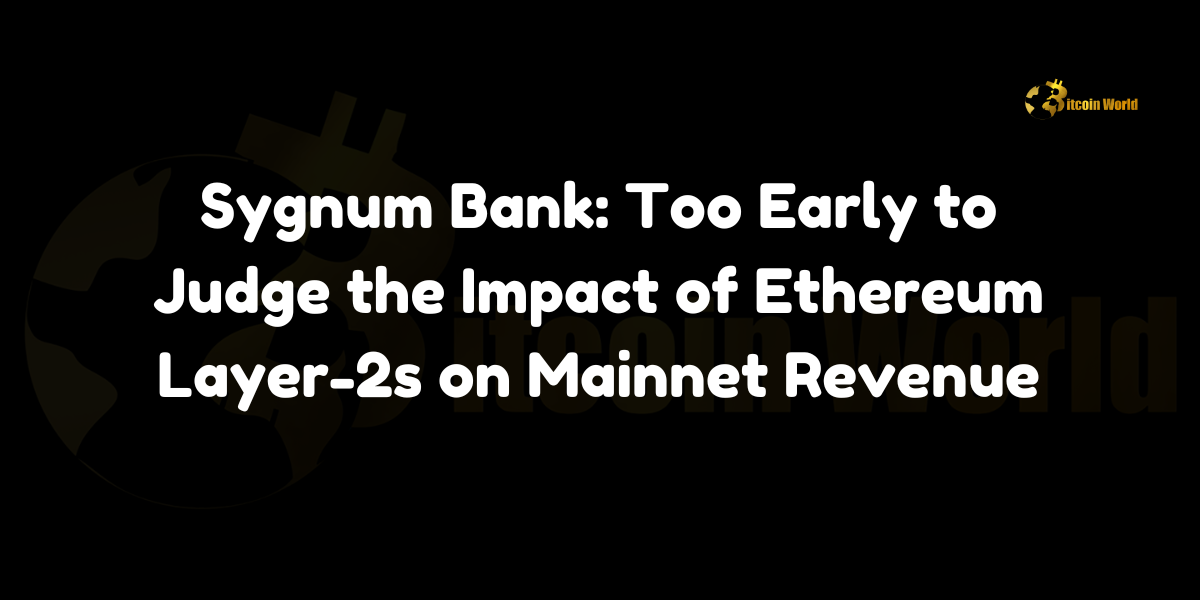Sygnum Bank: Too Early to Judge the Impact of Ethereum Layer-2s on Mainnet Revenue
In the evolving landscape of blockchain scalability, Sygnum Bank and Apollo Capital offer contrasting yet complementary insights into the effects of Ethereum’s layer-2 (L2) scaling solutions on the mainnet’s revenue and overall market position. Katalin Tischhauser, Head of Research at Sygnum Bank, expressed reservations about drawing definitive conclusions regarding the financial implications of Ethereum’s L2 advancements. Conversely, Henrik Andersson, Chief Investment Officer at Apollo Capital, remains optimistic about the long-term benefits of these scaling efforts, anticipating renewed growth and increased market dominance for Ethereum.
Introduction to Ethereum’s Layer-2 Scaling
What are Layer-2 Solutions?
Layer-2 (L2) solutions are protocols built atop the Ethereum mainnet (layer-1) designed to enhance scalability, reduce transaction fees, and increase throughput. By offloading transactions from the mainnet, L2s aim to address Ethereum’s inherent limitations, making the network more efficient and user-friendly.
Importance of Layer-2 for Ethereum
Ethereum’s popularity and widespread adoption have led to congestion and high gas fees, hindering its usability for everyday transactions and decentralized applications (dApps). L2 solutions like Optimistic Rollups, ZK-Rollups, and Sidechains seek to mitigate these issues, enabling faster and cheaper transactions without compromising the security and decentralization of the Ethereum mainnet.
Sygnum Bank’s Perspective: Cautious Optimism
Too Early to Judge
In a recent interview with Cointelegraph, Katalin Tischhauser, Head of Research at Sygnum Bank, emphasized that it is premature to assess whether Ethereum’s L2 scaling is diminishing mainnet revenue or fostering net growth. Tischhauser highlighted that while L2 networks naturally divert some business away from the mainnet, their enhanced scalability could unlock new revenue streams that were previously unattainable.
Potential Revenue Opportunities
Sygnum Bank recognizes that L2 solutions could lead to the development of innovative financial products and services. The increased transaction speed and lower costs may attract a broader user base and enable more complex financial interactions on the Ethereum platform, potentially compensating for the reduced transaction fees on the mainnet.
Balanced View on Scalability
Tischhauser’s assessment underscores the complexity of the relationship between L2 adoption and mainnet revenue. While there is an initial displacement of transactions to L2s, the overall ecosystem’s growth and the emergence of new use cases could balance or even exceed the revenue impact on the mainnet.
Apollo Capital’s Henrik Andersson: Optimistic Outlook
Maintaining Ethereum’s Leadership
Henrik Andersson, Chief Investment Officer at Apollo Capital, provided a more bullish perspective on Ethereum’s L2 scaling efforts. Andersson believes that these developments are crucial for maintaining Ethereum’s leadership among layer-1 blockchains, effectively preventing users from migrating to alternative chains.
Long-Term Revenue Growth
Andersson anticipates that Ethereum’s L2 solutions will drive long-term revenue growth by enabling higher transaction volumes and attracting institutional investments. He posits that the scalability enhancements will not only retain existing users but also draw in new participants who were previously deterred by high gas fees and slow transaction times.
Price Projections
Building on the positive impact of L2s, Andersson predicts that Ether (ETH) could narrow its price gap with Bitcoin (BTC) and potentially reach a new all-time high by 2025 or shortly thereafter. This projection is based on the expectation that improved scalability will lead to increased adoption and usage of the Ethereum network, thereby boosting its market value.
Analysis of the Impact on Ethereum’s Revenue
Displacement vs. Growth
The core question revolves around whether L2 scaling solutions will lead to a net loss or gain in revenue for the Ethereum mainnet. While L2s undoubtedly divert some transaction volume away from layer-1, the enhanced capacity and lower fees could facilitate a surge in overall activity on the Ethereum ecosystem.
Unlocking New Use Cases
L2 scalability can enable more complex and higher-volume use cases, such as decentralized finance (DeFi) applications, non-fungible tokens (NFTs), and enterprise-grade blockchain solutions. These new use cases have the potential to generate significant revenue streams, offsetting any decline in mainnet transaction fees.
Enhanced User Experience
Improved scalability leads to a better user experience, attracting more developers and users to build and interact with Ethereum-based applications. A larger and more active user base can contribute to sustained growth and revenue generation for the Ethereum mainnet through various channels, including token sales, staking, and ecosystem incentives.
Expert Opinions
Dr. Emily Carter, Blockchain Analyst
“Ethereum’s layer-2 solutions are a double-edged sword. While they may reduce some transaction volume on the mainnet, the overall growth and new use cases they enable can lead to a more vibrant and profitable ecosystem. It’s a delicate balance that requires careful observation and strategic planning.”
Mark Thompson, Financial Strategist
“The scalability improvements brought by layer-2 solutions are essential for Ethereum’s continued dominance. By addressing the mainnet’s limitations, Ethereum can sustain its competitive edge and attract both retail and institutional investors, driving long-term revenue growth.”
Sarah Lee, Cryptocurrency Researcher
“The integration of layer-2 solutions is a testament to Ethereum’s adaptability and commitment to innovation. While there may be short-term shifts in transaction dynamics, the long-term potential for ecosystem expansion and revenue diversification is significant.”
Future Outlook
Monitoring Ethereum’s Growth
As Ethereum’s L2 solutions continue to develop and gain adoption, it will be crucial to monitor their impact on the mainnet’s revenue and overall network health. Stakeholders should focus on metrics such as total value locked (TVL) in DeFi applications, transaction volumes across different layers, and the emergence of new use cases.
Strategic Investments
Investors and developers should consider the evolving dynamics of Ethereum’s scalability solutions when making strategic decisions. Investments in projects that leverage L2 technologies or contribute to the ecosystem’s growth can potentially yield substantial returns.
Regulatory Considerations
As Ethereum scales and its ecosystem expands, regulatory frameworks will need to adapt to address the complexities introduced by layer-2 solutions. Ensuring compliance and fostering a secure environment for innovation will be paramount for sustained growth.
Conclusion
The discourse surrounding Ethereum’s layer-2 scaling solutions reveals a nuanced landscape where initial concerns about revenue displacement are balanced by the potential for ecosystem growth and new revenue opportunities. Sygnum Bank’s cautious optimism and Apollo Capital’s optimistic projections highlight the diverse perspectives within the financial and blockchain communities.
As Ethereum continues to implement and refine its layer-2 technologies, the long-term impact on mainnet revenue and market leadership will become clearer. The successful integration of these scaling solutions is likely to play a pivotal role in Ethereum’s ability to maintain its dominant position in the blockchain space, drive innovation, and achieve sustained financial growth.
To stay updated on the latest developments in Ethereum scalability and cryptocurrency market trends, explore our article on latest news, where we cover significant events and their impact on the digital asset ecosystem.





